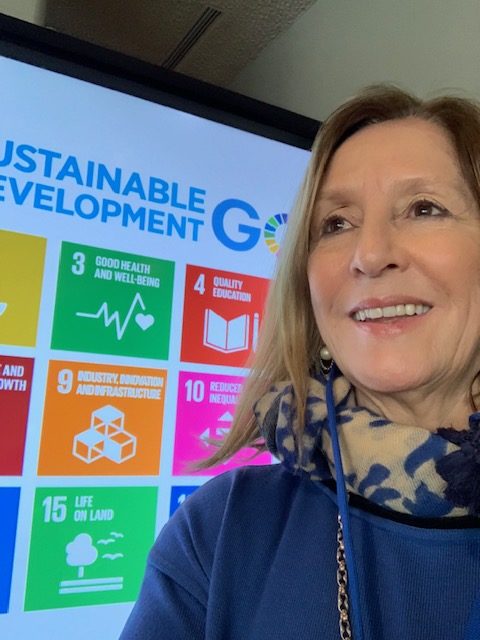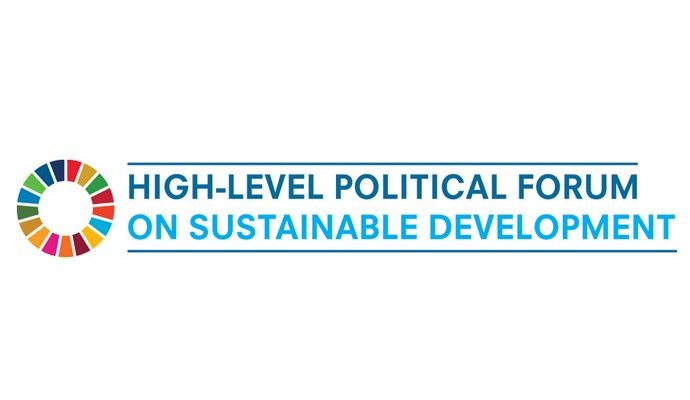A blog by SI UN Representative New York, Maria Fornella.
“On August 14, 2019, the Webinar for a “Debrief on HLPF 2019 and an Exchange on the SDG Summit” was jointly held by Together 2030 and TAP Network (Transparency, Accountability and Participation for 2030 Agenda). I hadn’t attended the HLPF and was glad at the opportunity to attend this Debrief, which was a very lively critique of the HLPF. It was facilitated by Arelys Bellorini (Together2030) and was organised around two panels: a Thematic Review and a Review of the VNRs (Voluntary National Reports) followed by a highly participatory Q&A session. The following is a summary of my take on the discussion, highlighting main concerns raised about the process, and a glimmer of hope for the future of the HLPF.
Overall, there was a general sense of disappointment at the lack of progress registered, at the lack of engagement by the most powerful member states, and at the HLPF process itself.

Photo: SI UN Representative New York, Maria Fornella
Alessandra Nilo (Executive Coordinator, Gestos, Recife, Brazil) for example, expressed her concerns about the failure of the member states to deal with deep-rooted inequalities in a coherent way. While some progress was noted in Health Care and Education, those improvements were jeopardised by increasing poverty. In the Employment sector, the positive sign of job growth was less meaningful than the numbers appear to indicate, since new job creation was mainly in low wage occupations and in the context of a weak legal framework. She reiterated that little or no improvement has benn registered on Social Protection, leaving many vulnerable populations behind in the areas of access to Health and Education.
As far of the process itself, Alessandra warned that the space of civil society in negotiations and participation is shrinking rapidly. This was echoed repeatedly by other panelists and attendees. The modality of negotiations makes it very hard for NGOs to engage with governments. The negotiations for the Political Declaration were closed before the HLPF in September, so there was no opportunity for inputting. Big countries have been extremely quiet and non-committal during the HLPF, and more progressive countries are afraid that re-opening negotiations may result in losses of already agreed upon language.
The attitude of big players, be it countries or corporations, is weakening multi-lateral participation. The UN itself is constantly under fire so it is moving cautiously to find ways for more NGO participation without upsetting the fragile balance.
Goal 17 (global partnerships for sustainable development) is falling behind, particularly concerning the implementation of measures already agreed upon. Indeed, the international community is lagging on implementation of most SDGs, especially for the most vulnerable populations.
John Romano (TAP Network) highlighted the issue of Accountability: governments need to be more explicit on their commitments so that they an be held accountable. He added that there was very little discussion of inter-linkages among the SDG and that both member-states and civil society should work harder to integrate them in the understanding that they all need to be tackled as a whole for real progress to occur.
Addressing the VNRs session, panelist Gomer Padong (Philsen, Philippines) reiterated the same frustration as other panellists at the minimum participation of civil society, which is seldom included in member-states’ delegations. Civil society organisations produce high-quality Shadow Reports which are presented to the Commission only after those of the nation-states, which raises the issue of whether they are considered at all. VNRs are used as an opportunity for member states to boast about their achievements but never to express concerns or identify national shortcomings and ask for help from others, so that collaboration and peer learning can take place. Indeed, as our own UN Representative Frances Zainoeddin later commented during Q&A session, reports are “fed into” the HLPF but very little comes out of it in the form of recommendations to member-states. What is being agreed upon at the global level has little or no influence on national decisions and policies. “HLPF has no clout, no “teeth”, and she posed the question of whether the restructuring of the mechanism would find ways to solve this.
Gomer also highlighted the need to mainstream the role of Parliaments in the main session, since it is the Legislative Power that localises the global agenda into national laws and policy, besides having two other important powers: the power of the purse, and the function of oversight of the Executive.
Other two important suggestions broached by attendees were the absolute need to include civil society representation within each member-state delegation, and the idea of establishing criteria for VNRs and a “score card” where best practices as well as under-performances would be recorded.
On the positive side, all participants agreed that side events were very useful for information, networking and cross-learning. There were calls for Civil Society to reclaim its space and speak with a unified voice to increase its influence.
To conclude, John Romano (TAP Network) stressed the importance of the coming Review and Reform of HLPF as an opportunity to strengthen the HLPF system, create more of an incentive structure, increase nation-states interest and ambition on the process, and use accountability as a tool to get SDGs to full fruition. He mentioned the SDG 16 Plus campaign, with voices on the ground to monitor implementation. He stressed the value of HLPF in bringing civil society together and share stories, experiences and challenges going forward. He pointed out that the Rome Civil Society Declaration got a lot of traction during the process, even with nation-states (Rome Declaration TAP Network). Finally, he announced the launching of a Decade of Action and Accountability (2020-2030).”

